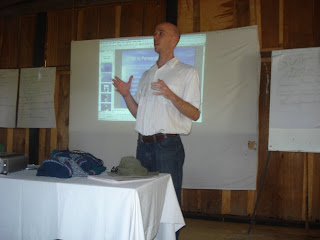Mom and dad visited a couple of weeks ago. We took them to Kampala and booked rooms, but there was some mix-up and their room was not self-contained room. Wanting to make my parents feel comfortable in my Ugandan home, I tried to convince the lady who ran the place to give them a room with an en-suite bathroom. There was an empty room but it needed some cleanup, so I asked when it could be ready. Her reply: "15 minutes"...long pause, "or...never."
With all the momentum behind the Juba Peace Process--the plan to negotiate the last item on the agenda and have all parties sign within a few short days in April--it seemed like it was all going to happen, in perhaps the same time frame as my parents' room. 15 minutes...or never.
The first time we really expected/hoped/doubted that Kony would sign the final peace agreement (April 10th) I was on Ssese Island for the CPA staff induction. I sat with Immaculate, Sylvia and Tonny on the edge of the water and we watched the sun set while we listened to the day's news on radio. In this case, no news was bad news. If the peace agreement had been signed, something would have been reported. But it got darker and still the announcer said nothing about what we hoped to hear.
While peace delays, our days have been full. We finally had some time in an Acholi village--something we've planned to do for a long time. We spent a week in grass thatch hut.

We were hosted by a Parent Support Group that we've interacted with a lot over the past years. Ben spent time in the garden with the men, constructed a chicken house and swept the compound.
As much as possible, I wanted to do what a traditional Acholi woman would do. I woke up each morning and swept and mopped the hut and then carried water from the well (on my head) and prepared the water for Ben to bathe. I had to take a break from feminist practice in order to really experience tradition. I practiced Acholi and listened to countless stories of village gossip, usually involving someone allegedly stepping on charms, speculation about who was charming who, etc. I wanted to learn Acholi cooking, so every day I went to a different household to make lunch and dinner. That meant twice a day of collecting food from the garden, pounding sesame or ground nuts, then grinding, cooking, serving, kneeling for washing hands before eating. All the pounding, grinding and cooking takes place in kitchens that have charcoal fires and virtually no ventilation.

After the first day, my back ached, my eyes burned and my hands were covered in blisters. Because of the novelty of it, and because my effort was so appreciated--it somehow retained an element of fun. Were I born in that village, and the work was all I knew and it was as thankless as it is for most of the women, it would not have been fun. It is tough being an Acholi woman. And they are tough.
After supper, the drums come out and there is dancing for those with any sweat left in their bodies.

One evening after we danced we sat around a fire and told stories. It felt like any typical campfire, and they told stories with an easiness in their voices. The ensuing laughter would have given the impression to anyone that subject matter was light. But they were all stories of war, encounters with rebels, nights spent lying in maize fields shivering in terror in hope of escaping being burnt in their huts. They could laugh, because they felt safe. They felt like what the recalled was behind them. The unspoken claim was, "It's over." One of the women my age turned to me and said, "I've never known anything like peace in my life." I held her hand, and hoped that it really was over, and that she would know peace now. It is all so fragile, maybe deceptive--this fake or fragile peace we're enjoying in northern Uganda.

It was wonderful to spend time with my parents when they visited. We shared a taste of life in Lira, work in Gulu, Philip's traditional marriage in Kampala and a game drive and relaxing at the lodge in Murchison. My favorite animal is the giraffe.

We thought we'd miss the big cats. The grass was so tall, my dad said, "they could be 15 feet away and we wouldn't even know it." At that moment we saw this one, a baby, even less than 15 feet away. It's mother woke up and another cub emerged and the threesome ran off.

Mom and jelly bonded.

We finished our time with them dropping them off for a conference they had in Jinja. An hour before they had to arrive dad suggested bungee jumping. I've never had any desire to do it (I don't like the sensation of my heart being in my throat), so mom and I watched Ben and dad leap off a huge tower at Bujagali falls down to the Nile below them. I think we were more scared than they were.
I can hardly believe how soon we will be leaving for London. In periods of transition time takes on a curious character. The days somehow seem longer, but the months fly. I find myself in the middle of a tension, straining toward what's ahead and dissolving into nostalgia/regret on what's past. I find equilibrium in the middle of that tension. I manage to be fully present. In those moments every conversation has it's own life and meaning and each encounter is accepted and appreciated for what it is. It's often humbling. Sometimes, my expectations far exceed the reality and I wish for more. Usually, I feel grateful.












































